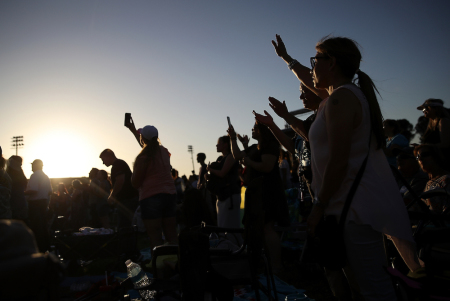US evangelicals are not as hated as they might think: sociologist

Evangelical Christians in the United States are not as negatively viewed as they might think, according to a sociologist who recently spoke with the National Association of Evangelicals.
Bradley Wright, associate professor of sociology at the University of Connecticut, was interviewed by NAE President Walter Kim in a podcast posted online on Sunday.
When Kim asked Wright "if there is a difference" with “how people outside of faith perceive Christians in general and evangelicals in particular," Wright talked about the Pew Research Center and their highly publicized surveys on how “warmly” Americans feel about various religious groups.
He explained that evangelicals normally fall in the “middle of the pack,” being ranked warmer than groups like atheists and Muslims, yet colder than Catholics and Jews.
Wright, however, warned that such surveys have “very unstable” data, with the results likely to change considerably over the months, even with the same sample.
“I think the short answer is that its ‘middle of the pack’ is how people view evangelicals, but it varies somewhat,” said Wright.

Wright noted that this “tends to be different than how evangelicals think other people think about” them, proposing that evangelicals tend to think of the general population as being more hostile.
“Maybe that’s part of the fear narrative is that we tend to think like, ‘well, everyone hates us’ or ‘nobody likes us’ or something like that. I don’t think that’s true,” he explained.
“The wrong narrative is ‘nobody likes us, we’re failing, and a third of Americans don’t want anything to do with religion.’ I think a more accurate narrative is people have somewhat mixed feelings about evangelicals, like they do about most religions and as they do about a lot of things in the world. And there’s a lot of people who just aren’t sure what they think about religion.”
Wright also took issue with the claims about Christianity in America being in decline, noting that it varies among different denominations and movements within the faith.
For example, according to Wright, religious groups such as evangelicals are maintaining their numbers, while mainline Protestants are indeed suffering severe decline.
Wright told Kim that he credited the popularity of the decline narrative as being captivating to different groups for different reasons, saying that it “benefits different people.”
“Journalists can use it to get their stories published, pastors can use it to sort of motivate their flock to pay attention to them. Book writers can use it to sell books. Conference givers can use it to get people to enroll in their conference,” he explained.
Earlier this month, Paul Djupe of the Public Religion Research Institute wrote a report published by Religion in Public titled, “Perceived Discrimination toward Christians is Highest Living Among Christians.”
Djupe analyzed data from the Voter Study Group’s Nationscape and found that Christians living in largely conservative states were more likely to believe that Christians face discrimination than those living in largely liberal ones.
“If Christians are persecuted by the non-religious, then Christians in Vermont and Oregon would be on top of the list. However, the opposite is true – the highest reported values come from Christians in Mississippi, Alabama, and Tennessee,” wrote Djupe.
“The lowest rates are reported in the northeast – Connecticut, Massachusetts, Maine, Vermont, and New Hampshire. This is not the pattern that the elite rhetoric leads us to expect."





















